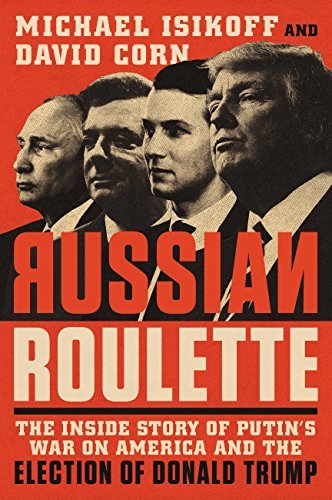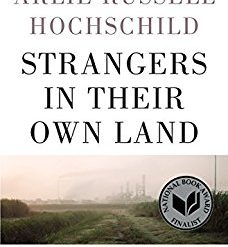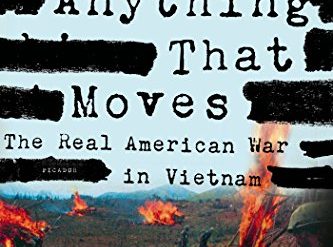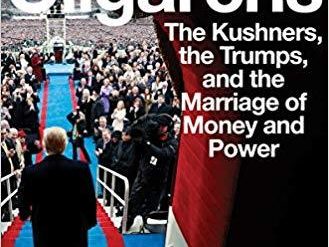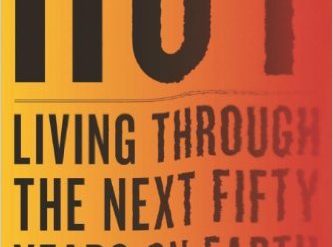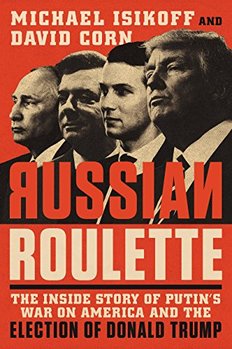
Unless you’ve experienced sensory deprivation for the last year and a half, you know that Russians influenced the 2016 election. Overwhelming evidence has come to light and dribbled out through hundreds of news stories and books. Not to mention the indictments that have already come down through Robert Mueller’s investigation of the Trump campaign’s multiple links to the Kremlin.
Estimated reading time: 5 minutes
Much less well known outside the confines of the American intelligence establishment are the facts about exactly what steps the Russian government took to destabilize US society and help Donald Trump win the White House. Now come veteran investigative reporters Michael Isikoff and David Corn with Russian Roulette. The book’s subtitle is the key: The Inside Story of Putin’s War on America and the Election of Donald Trump.
If you’ve closely followed the unfolding story about the multiple connections between Donald Trump’s associates and top Kremlin officials, the so-called oligarchs, and the Russian mafia, you’re unlikely to find much in Russian Roulette that will surprise you. The book contains abundant detail, fleshing out the often-sketchy stories that have surfaced in the press; seemingly, every individual name that has come to light over the past eighteen months in the reporting of this unfolding scandal figures in the authors’ account. There are few startling revelations in this story, which has been extensively covered by the New York Times, the Washington Post, MSNBC, CNN, The New Yorker, and other American news outlets.
Russian Roulette: The Inside Story of Putin’s War on America and the Election of Donald Trump by Michael Isikoff and David Corn (2018) 353 pages ★★★★☆
The true value in Russian Roulette lies elsewhere. Isikoff and Corn’s book excels in its detailed description of the massive effort mounted by Russian intelligence to deepen the divisions and distrust within American society, destroy Hillary Clinton’s reputation, and help Donald Trump win the presidency. In Russian Roulette, you’ll meet the players central to the massive Russian campaign, including the St. Petersburg-based Internet Research Agency and the two large hacker groups dubbed Cozy Bear and Fancy Bear by US intelligence. At a minimum, two hundred Russians were engaged in the Kremlin-driven effort over at least two years. Only in recent months has the full extent of this campaign come to the attention of the US public.
Vladimir Putin and the 2016 election
Despite the repeated denials from the White House and Trump loyalists in Congress and on Fox News, there can be no doubt whatsoever that the Russian influence campaign was real. Early in January 2017, two weeks before Donald Trump’s inauguration as President, the heads of the four top US intelligence agencies issued a joint statement. “With ‘high confidence,’ the assessment stated, ‘Russian President Vladimir Putin ordered an influence campaign in 2016 aimed at the US presidential election. Russia’s goals were to undermine faith in the US democratic process, denigrate Secretary Hillary Clinton, and harm her electability and potential presidency. We further assess Putin and the Russian Government developed a clear preference for President-elect Trump.'”
The statement was signed by James Clapper (Director of National Intelligence), John Brennan (CIA), Michael Rogers (NSA), and James Comey (FBI), the four most senior intelligence officials in the US government under President Barack Obama. Given the rivalry within the intelligence community—and the time it took them to reach agreement on the wording—this assessment is remarkable.
Did the Russians help Donald Trump win?
More than 130 million votes were cast in the 2016 presidential election. Innumerable factors contributed to Trump’s victory, including strategic errors by Hillary Clinton and her staff, Trump’s demagogic skills, successful years-long Republican efforts to suppress minority voting, the failure of the Obama White House to highlight and respond to the Russian influence campaign, and James Comey’s misleading announcement eleven days before the election that the FBI was investigating a fresh collection of Hillary Clinton emails. If a mere 70,000 votes had changed hands in the three swing states of Pennsylvania, Ohio, and Wisconsin, Clinton would have won the Electoral College as well as the popular vote.
Given these facts, it’s impossible to determine whether the Russian campaign was decisive. And the joint statement by the intelligence community insisted that “‘We did not make an assessment of the impact that Russian activities had on the outcome of the 2016 election.'” Yet, reading between the lines, it appears the the authors have drawn their own conclusion—that Putin’s gambit did in fact play a significant role in Trump’s election. Isikoff and Corn drive this point home with a colorful detail: “the Russian Duma burst into applause when informed Trump was the victor. Putin’s operation—which had fueled divisions within the United States and influenced an American presidential election—had succeeded.”
About the authors
Michael Isikoff is currently the Chief Investigative Correspondent for Yahoo! News. He previously served in senior roles at Newsweek and NBC News. Russian Roulette is his third book.
David Corn is chief of the Washington bureau for Mother Jones. Previously, he was The Nation‘s Washington correspondent. He won the prestigious George Polk Award for his reporting in 2013. Corn has written six books, including one novel and four other nonfiction works as well as Russian Roulette.
For related reading
Previously I’ve reviewed several other books about Donald Trump’s Russian connections, including Fire and Fury review: Exposing the chaos in the Trump White House and Collusion exposed, but is there more? Is Donald Trump a Russian agent?, my review of Collusion by Guardian reporter Luke Harding.
Click here for more Good books about Vladimir Putin, modern Russia and the Russian oligarchy.
Like to read books about politics and current affairs? Check out Top 10 nonfiction books about politics.
And you can always find my most popular reviews, and the most recent ones, on the Home Page.

